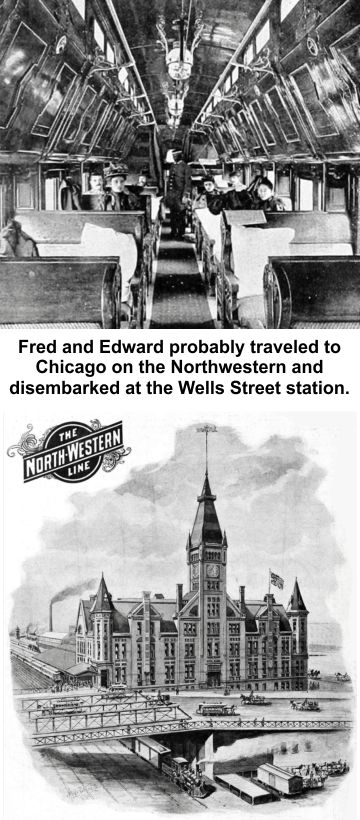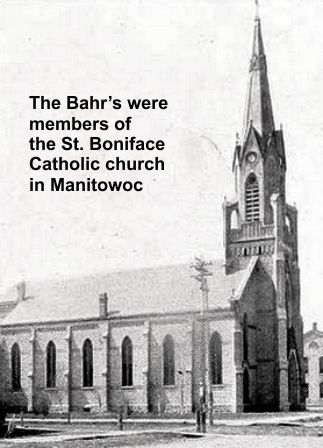|

Today an automobile trip from Manitowoc, Wisconsin,
south to Chicago would take about three hours. In
December 1903, by train, it would have taken the
Bahr family over nine hours. Fred Bahr (1842–1913)
and his wife, Rose Hermann Bahr (1851–1923), were
long-time Manitowoc residents, having emigrated from
Germany with their parents in early childhood.*
Other than his three-year tour with the Union army
during the American Civil War,† Fred had been in
Manitowoc for the last forty-nine years. Rose had
spent over thirty of those years in the same house
at 1207 Eleventh street.
In their thirty-four years of marriage, while
raising seven children‡, they had watched
Manitowoc's population double, reaching nearly
12,000 by 1903. In 1901 Fred was given a front-row
seat from which to view the challenges of a
fast-growing village when he was appointed street
commissioner. A year later, control of invasive
Canada thistles was added to his responsibilities.
(I thought being Commissioner of Canadian Thistles
must have been unique. Not so. The position existed
in the late 1800s/early 1900s at state and local
levels around the country.)
In Chicago were nearly two dozen family members Fred
and Edward might have visited:
-
Emma Bahr Mock and her husband, John Mock —
Fred's daughter/Edward's sister.
-
Anna, her husband, hair dresser Frank Milski,
and their young son, Eugene Milski — Fred's
daughter/Edward's sister and cousin.
-
John Bahr, who lived with Anna and Frank Milski
and worked as a bartender — Fred's son/Edward's
brother and soon to be a roommate.
-
Amelie/Amalia Hermann Stucke, her husband
William, and their three children, Emma, Fred,
and Edward — Fred's sister-in-law/Edward's aunt
and cousins.
-
Franziska Frances Hermann Krause and her
husband, dressmaker Fred W. Krause, and their
four children — Fred's sister-in-law/Edward's
aunt and cousins.
-
Caroline Hermann Schultz, her husband Cristoph
(who went by William), and their four children —
Fred's sister-in-law/Edward's aunt, and cousins.
|

|
More than they bargained for
Around noon on December 30, 1903, twenty-two-year-old Edward and his
sixty-one-year-old father, sometimes called Fritz, left off family gatherings
and ventured into the Windy City. Their destination: an afternoon theater
matinee advertised as an extravaganza of pretty girls, costumes, music, and
ballet dancers flying through the air. By day's end, they could say they saw all
that and then some.
Family sorrow back in Manitowoc derailed Fred's fifteen minutes.
Any thoughts Fred had of giving an interview to local papers about he and
Edward's harrowing Chicago ordeal were probably extinguished when Rose's
eighty-two-year-old widowed mother, Sophia Hils Hermann, died the day after the
Iroquois Theater fire. The funeral, scheduled for the following Monday, January
4, 1904, gave Fred and Edward time to take a train home from Chicago to help
Rose make funeral arrangements and figure out how to accommodate a small army of
guests. The Hermann's were a fertile and healthy lot. In addition to Fred and
Rose's seven children, ten of Sophia's fifteen children were surviving, most
living in Manitowoc, the others within a day's rail travel, and many with big
families. In the immediate family were several dozens.
Sophia's health might also explain why Rose was not at the theater with her
husband and son, might not have made the trip to Chicago. Sophia had been ill
for a long time, but if her end was foreseen, Rose might have remained at her
mother's bedside.
In the years after the fire
John Bahr married Isabel Larson in 1908 and
remained in Chicago for the rest of his life.
Edward Bahr moved to Chicago soon after the fire, went to work as a bartender at
the Palmer House hotel, married Hattie Golding, and they had a daughter. By 1910
he'd returned to Manitowoc with his family. If safety was part of Manitowoc's
appeal, it must have seemed ironic that it was in Manitowoc that their daughter
was hit by a streetcar in 1914. She wasn't seriously injured, living for another
fifty-four years, marrying and having two children, one of whom became a nurse.
Fred Bahr retired in 1906 and passed in 1913.
Rose Bahr lived
 for a decade after her husband, during which she suffered the loss of their
daughter Minnie. She remained throughout in their home on Eleventh avenue.
for a decade after her husband, during which she suffered the loss of their
daughter Minnie. She remained throughout in their home on Eleventh avenue.
As is often the case working on an Iroquois Theater
story it is with a sense that if I just looked in one more place I
might find a nugget. Had I the wherewithal to hit the road, I'm sure
there's a trove of information at the
Manitowoc Historical Society.
The Hermanns and Bahr's were not wealthy, influential or powerful but by shear
numbers surely made a mark in the community.
|
|
Discrepancies and addendum
* Rose's name was recorded with all manner of
spelling variations, including Euphroime, Ephasena,
Ephesene, Euphrosine, Euphrosina, Aprosina, and
Eprosina. Understandably, she went by nicknames,
with almost as many variations: Rosina, Rosalie,
Prosina, Rose, and Rosa. Her obituary stated she was
born in Manitowoc, but that was incorrect. She was
born in Germany and immigrated to the U.S. with her
parents. To make genealogists eyes cross, two
Herman/Hermann baby girls arrived in America around
that time. One was nine-month-old Euphrosine
Hermann, who arrived in September 1851, daughter of
Peter and Katherine. A year later, in August of
1852, came two-year-old Euphroime [sic] Herman,
daughter of Valentine and Sophia Hils Herrmann, the
Rose in this story.
† Fred enlisted in August 1862 and served as a
private in the 21st infantry. A shot in the hand in
Bentonville, NC, on March 19, 1865
left one finger stiff, but he remained in service
until June. Doing carpentry work with a bum finger
must have been challenging.
‡ An eighth child, a daughter named Alvina Bahr,
died in infancy.
|
